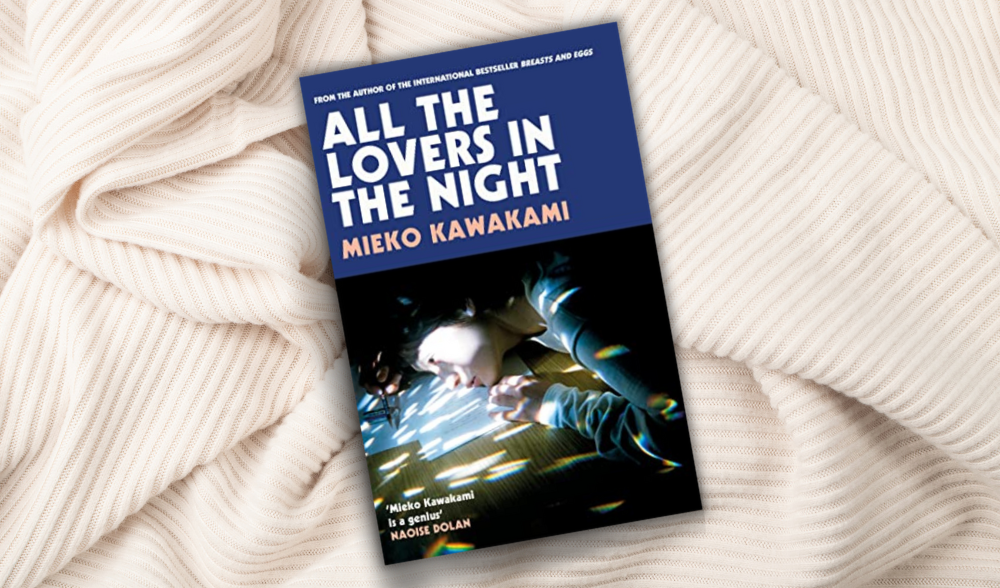BOOK REVIEW EDITOR-IN-CHIEF ELLA KELLEHER WRITES – Like a hamster sprinting on its wheel, going precisely nowhere, thirty-four-year-old freelance copy editor Fuyuko Irie does not question the mundanity of her daily routine. Japanese author Mieko Kawakami’s latest release, All the Lovers in the Night (2022), follows a character with no real friends, no boyfriend, and no true passion for her work. She doesn’t drink and has had sex only once, back in high school. Except for her strange relationship with her narcissistic supervisor, Hijiri, Fuyuko is entirely on her own.

Everything begins to unravel once Fuyuko actually risks venturing out for a night of drinking both sake and beer. Glancing at her reflection in a store window, she becomes terrified: “What I saw in the reflection was myself, in a cardigan and faded jeans, at age thirty-four. Just a miserable woman, who couldn’t even enjoy herself on a gorgeous day like this, on her own in the city, desperately hugging a bag full to bursting with the kind of things that other people wave off or throw in the trash the first chance they get.” Thus, Fuyuko begins to use boozy escapism to forget the horrors of everyday life. Just a single cup of sake enables her to “let go of [her] usual self.”
Acclaimed Japanese writer Mieko Kawakami (author of Breasts and Eggs from 2020 and Heaven from 2021) focuses on protagonists who struggle within societal confines. In Breasts and Eggs, Makiko battled prevalent stereotypes of femininity, like women needing to be obedient homemakers. Heaven unveiled the cruelty unleashed onto two school children that society considers ‘different.’ Now, protagonist Fuyuko in All the Lovers in the Night (2022) battles against complacency. She asks: How can we all be individuals in a modern world where the standard eight-hour, passionless humdrum of work is the norm? Alas, for her, the answer is: Drink alcohol.
Desperate to feel a deeper engagement with life, Fuyuko enrolls in a class at a local university. She meets a physicist named Mitsutsuka, who immediately electrifies her with his charm. Fuyuko allows herself to be vulnerable with him and admits her peculiar obsession with light and dark. Mitsutsuka explains the complexities of photons, reflectivity, and the theories surrounding what we can and cannot see. An interesting parallel emerges – the two become each other’s light source. And brewing in the dark, unseen places is attraction, if not love.

As the novel progresses, Fuyuko meets with Kyoko, a friend who set up her freelance editing gig. In this meeting, we are offered some brilliant irony surrounding the condition of modern womanhood. Kyoko, half-drunk, congratulates Fuyuko on her newfound career independence while simultaneously criticizing Hijiri (Fuyuko’s self-obsessed, go-getter boss) for the exact same autonomy. Kyoko sloppily tries to avoid offending Fuyuko by stating that “there are lots of people who want to put themselves out there, competing for the spotlight… [which] makes more problems for the rest of us. But you don’t have to worry about that, because you’re not like that.” In other words, you’re not a real threat because you’re not that driven and won’t go that far anyway.
Kyoko continues to berate Hijiri, who she envies for her success, and other independent women in her position by judging her frivolous sex life and her good looks. Kyoko rants that career-oriented women “put so much pressure on the women around them… [women] in the office need to live up to her example and look pretty while they’re at it.” With perfect comedic timing, Kyoko presents her congratulatory gift to Fuyuko – the same perfume that boss Hijiri gave Fuyuko as a gift earlier in the book. Kawakami includes this subtle but effective detail to point out how despite criticizing women who follow society’s code of femininity, Kyoko still gives in to the same beauty standard.
Kawakami’s genius, magnified by Sam Bett and David Boyd’s combined translation skills, lies in the idea that women often mold themselves into narrow beauty standards and roles of femininity even while consciously despising doing so. Why? Because of our very human desire to be loved. Fuyuko is skeptical of motherhood and financial dependence on men. Still, her passion for Mitsutsuka is enough to make her at least try to fit the societal expectation of the ‘perfect woman.’ For their final date, she morphs herself into a clone of Hijiri – clothing, makeup, hair, and all.
The emotional precipice of All the Lovers in the Night is not the truth that Mitsutsuka reveals about himself – that he is a fraud. Instead, it is a haunting and utterly devastating line Hijiri hisses at Fuyuko after her date that echoes back to Fuyuko’s most heart-breaking sexual assault in her teenage years. Kawakami forces the reader to question why it is that women inflict such insidious wounds on one another. Her stellar writing never loses focus on the massive patriarchal structures that overshadow the events of the novel and lead women characters down divergent paths. A quick and emotionally impactful read – Kamakami’s latest is worth the time and possible tears.

LMU English major graduate Ella Kelleher is the book review editor-in-chief and a contributing staff writer for Asia Media International. She majored in English with a concentration in multi-ethnic literature.

